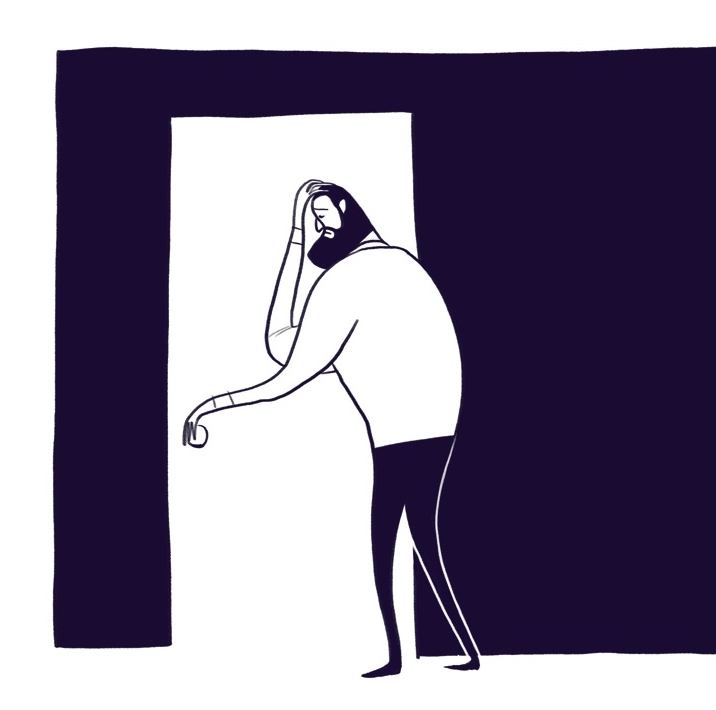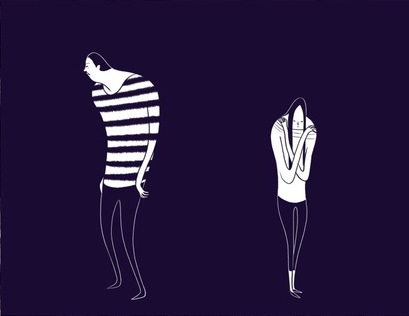Can You Practice Letting Go of Shame?

Shame is a very natural emotion that we all have to contend with from time to time. But it can also be very dangerous if left by itself to grow unchecked, leading to low self esteem and risky behaviors.
This post originally appeared on our Member Site blog, where experts respond to members’ questions and concerns. To sign up for our special offer and benefit from the Allies in Recovery eLearning program, click here.

Illustration: Eleanor Davis
Shame: a Natural Human Emotion, but Toxic in Large Amounts
Shame is a human emotion, meaning we all experience it. It has even been suggested that it is the most primitive of all emotions, dating back to our origins as humans. Shame, however, is toxic in large amounts, and many of us find ourselves stuck in that leaky boat. Understanding how shame works is the first step in preparing to conquer it.
Shame researcher Brené Brown, Ph.D & LMSW, defines shame as “the intensely painful feeling that we are unworthy of love and belonging.” As opposed to guilt, which she summarizes as “I did something bad,” shame can be summarized as “I am bad.”
In her popular talk on TED, Listening to Shame, Brown explains that there is a high correlation between feelings of shame and addiction, depression, violence, suicide, eating disorders, etc.
The vicious cycle of shame
When you step back, it seems obvious how shame can become part of a vicious cycle: feelings of shame, or low self-worth, can be so painful that we seek out behaviors to dull that pain. Those behaviors however, are quite often a type of escape (drugs, alcohol, and other high-risk activities), and abuse or addiction often follow suit. Addictive behaviors create a whole new flood of shameful feelings, which sets us back off in search of something to dull the pain. And the wheel spins on and on.
When addiction is present, shame is a force that shows up all over. The addicted loved one, as described above, may very well be caught in a cycle of shame related to their addiction and the lows they have known. But you, the family, may also be experiencing your own brand of shame.
You might feel shame when you see your loved one’s behavior observed or judged by others. Or, you might feel shame around the kind of parent you feel you have been. You might feel shame about your own loss of control or negative attitude in response to your loved one. Indeed, the possibilities are endless. And shame won’t go away on its own, but rather will fester and deepen if left alone in the dark.
In fact, Dr. Brown says in no uncertain terms, “the less you talk about it, the more you’ve got it!” She enumerates the three things that shame needs to thrive: Secrecy, Silence and Judgement. She goes on to add, “shame depends on me buying the belief that I’m alone.”
And how to break this cycle
After years of studying this human – but lethal – emotion, Dr. Brown has boiled down the top three things that we can do to “break the shame spiral”:
1) Talk to yourself like you’d talk to someone you love (empathy for yourself)
2) Reach out to someone you trust (allow room for vulnerability, connection)
3) Tell your story (break the silence)
She explains that more than anything else, the antidote to shame is Empathy: “shame cannot survive being spoken, and it cannot survive empathy.”
If we take steps to follow Brown’s recommendations for obliterating shame, we are taking action on several levels simultaneously:
- working to feel better about ourselves, to lighten our load;
- becoming more attuned to the shame spiral our loved one might be stuck in; and
- becoming a more solid and positive support for our loved one.
No matter what, keep in the forefront of your mind that you are not alone.
Join our Member Site today to take full advantage of Allies in Recovery’s program, including 8 video modules, three blogs, and dialogue with experts in the fields of treatment and recovery. Learn more here.
